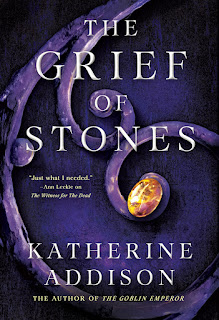 |
| The Grief of Stones by Katherine Addison |
The Grief of Stones is the third book in The Goblin Emperor, Addison’s wonderfully unique steampunkish world of goblins and elves, and the second in The Cemeteries of Amalo starring Thara Celehar, the Witness for the Dead. He’s a goblin priest whose job it is to communicate with the recently, and not so recently, departed on behalf of their families or the authorities to find out how they died, or to settle disputes.
The book starts soon after the previous ended. A marquise wants to know if his wife was murdered and Celehar sets to investigate. A case follows another and soon he is trying to figure out how to save foundling girls from an unscrupulous person.
The cases weren’t complicated, and the overall tone was that of a cosy mystery. But the latter lead to an encounter that changed Celehar’s life, maybe forever. The rest of the book deals with the aftermath and the never-ending politics of Amalo.
Celehar is not alone with his investigations. Out of the blue, he’s sent an apprentice, a widow who has had no formal training as a priest but who can also communicate with the dead. And he has the friends he made in the previous book that he can turn to, and does, despite being much of a loner.
The city of Amalo is as huge, strange, and complicated as ever. I never knew where anything was in relation to other places, but it didn’t really matter, though I would’ve welcomed a map (I don’t know if final versions come with those). There are trams and air travel, pneumatic tubes and photographing, but the overall impression is of a highly hierarchical society where traditions matter more than innovations. And nothing matters more than funeral traditions.
This was a sad book, much more so than the previous ones. Celehar is maybe ready to open a little after the tragedy in his past, but the rigid norms of the society make him afraid of even contemplating friendship, let alone love. He’s lonely. The cases of exploited girls were sad, and Celehar’s fate saddest of all, even though the book ends in a hopeful note.
The book wasn’t as much about the belief in humanity and decency as the previous ones, but it left me feeling positive in the end. And the hints about changes for Celehar make me eager to read the next book.
I received a free copy from NetGalley in exchange for an honest review.
No comments:
Post a Comment